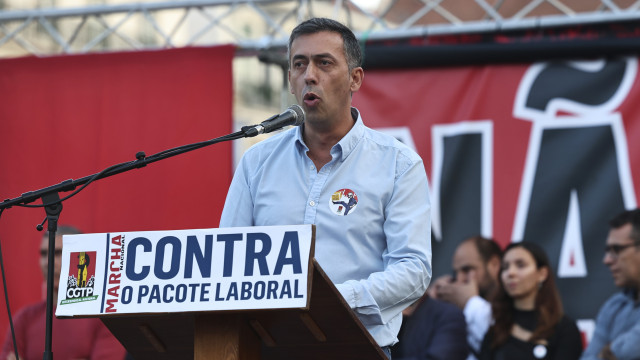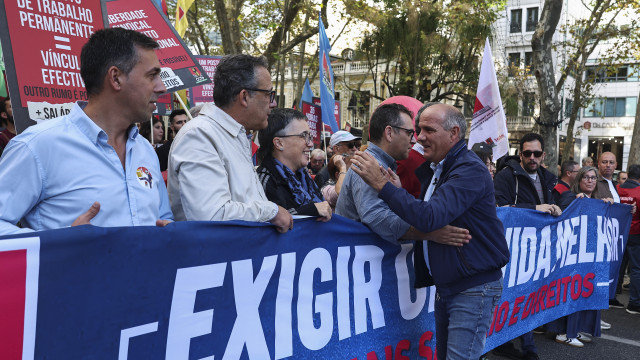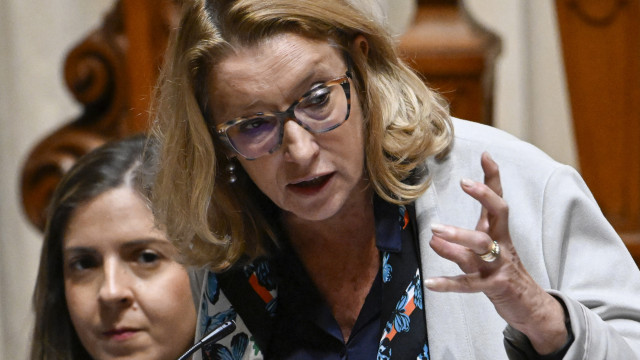Tiago Oliveira, the general secretary of CGTP, announced on Saturday in Lisbon a general strike scheduled for December 11, deeming the government’s labor package a “brutal attack” on workers. Following the announcement, political reactions swiftly emerged, advocating for dialogue with comments like “it smells of ‘troika’. What exactly was said?
“We announce the general strike against the labor package,” said CGTP general secretary Tiago Oliveira in a speech at Restauradores in Lisbon, at the end of the march against the labor package.
Tiago Oliveira stated that, “with positions already taken or in the final decision-making process by many union structures, it was possible to establish convergence for a general strike on December 11.”
The CGTP general secretary described this labor package as “one of the biggest attacks ever on workers,” reiterating that “it is a series of changes to labor legislation that, if passed, would be a real setback in everyone’s lives.”
The general strike will unite the unions of CGTP and UGT, the first in ten years.

Political reactions: “Smells of ‘troika'” or “has to happen”?
Paulo Raimundo, the general secretary of PCP, remarked that “times are not repeating,” but “there are traces.”
“It smells of ‘troika’, but not just now. It smells of ‘troika’ in the Budget, it smells of ‘troika’ in the dismantling of the National Health Service (SNS), it smells of ‘troika’ concerning Education and fees, it smells of ‘troika’ in labor law, it truly smells”, he stated.
João Ferreira, PCP councilor in Lisbon, reacted to the strike call with a brief phrase: “The attack is brutal, the strike is general”.
O ataque é brutal, a greve é geral.
— João Ferreira (@joao_ferreira33) November 8, 2025
Departing BE coordinator Mariana Mortágua pointed out that the PSD/CDS-PP executive led by Luís Montenegro is even “in many measures, more ideological than the government during the ‘troika’,” a period when “there was the excuse of a memorandum.”
“Now there are no excuses. This is an ideological government with a program for the country: a program to liberalize, privatize, sell what remains of the public service, attack work, create precarious labor relations, and lower wages”, she argued.

What do Belém’s candidates say?
Presidential candidate Catarina Martins argued that if the government’s package maintains the terms of the draft approved in July, “a President of the Republic must immediately refer it for preventive constitutional scrutiny.”
“I believe it is very important that all presidential candidates state their views on what they think of the government’s proposal”, she emphasized, noting that the labor package constitutes “an attack on labor” and “violates the Portuguese Republic’s Constitution” in terms of the right to strike and prohibition of unjust dismissals.
Abraços cheios de luta. De futuro e também de reencontro. Da luta pela vinculação de precários, pelos posto de trabalho, pela reforma por inteiro depois de uma vida de trabalho.
Se o governo quer um pacote laboral que torna a vida pior, as pessoas saem à rua por uma vida melhor pic.twitter.com/qTJjIfrIdN
— Catarina Martins (@catarina_mart) November 8, 2025
António Filipe, the PCP-backed presidential candidate, called the labor package “a weapon of the employers against workers” and promised he will be “in solidarity with the forms of struggle that workers decide to engage in to prevent this proposed legislative change from proceeding”.
“I know the election for President of the Republic is on January 18, the President of the Republic will take office only on [March 09], I hope by then this legislative proposal is defeated“, he stressed.
Uma grande acção de luta convocada pela CGTP-IN, onde os trabalhadores fizeram ouvir a sua voz contra o pacote laboral e o agravamento das injustiças.
Perante esta ofensiva, foi já anunciada uma Greve Geral para 11 de Dezembro.
O Presidente da República deve ouvir este sinal… pic.twitter.com/0aLrZ5NIxz
— Antonio Filipe (@AntonioFilipe) November 8, 2025
Meanwhile, Jorge Pinto considered that the government’s draft, as it stands, “represents a tremendous setback to workers’ rights” not seen “for many years,” emphasizing that it signifies “more precariousness” and “more working hours and an attack on the right to strike, making dismissal easier without the worker having the capacity to defend themselves.”
“As President of the Republic, and I say it with all clarity, I would politically veto this proposal if it reached me in its current form. And I think the government and the political parties in the Assembly of the Republic still have time to listen to these thousands of people,” stated the deputy and presidential candidate supported by Livre.

On the other hand, João Cotrim de Figueiredo argued that the flexibilization of labor laws “will have to happen sooner or later” and that it is “absolutely essential” for the law to be flexible to “accommodate various forms of work”.
“Just think about the absolutely sudden change happening to certain professions. The existence and emergence of some professions, the disappearance of others, the profound change in how certain professions are performed, all this will happen much more quickly, I dare say, than the law itself can keep up,” the presidential candidate told Lusa.

Meanwhile, presidential candidate António José Seguro urged the government to resume dialogue with the union centers to try and prevent a general strike.
“My appeal is directed to the government, to take initiatives so that dialogue can resume, taking into account the proposals that the workers, through their representatives, have presented, and avoiding the realization of this general strike, which will naturally have negative consequences for the country,” he stated to journalists in Guimarães.

What does the government’s draft for labor law revision say?
The government’s draft for labor law revision, being debated with social partners, proposes the revision of “over a hundred” articles of the Labor Code.
The proposed changes – labeled Work XXI, introduced by the government on July 24 as a “profound” revision of the labor legislation – cover areas from parental issues (with changes in parental leave, breastfeeding, and gestational mourning) to flexible work, company training, or trial periods in work contracts, also planning an extension of sectors required to maintain minimum services in case of strike.

Read Also: Thousands of workers march against the “employer’s” labor package




